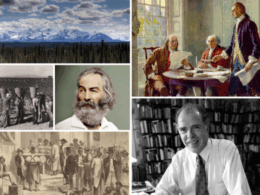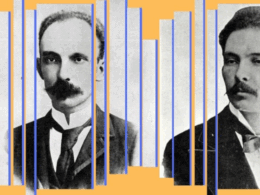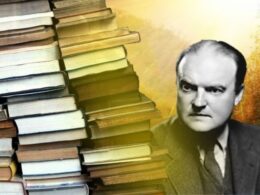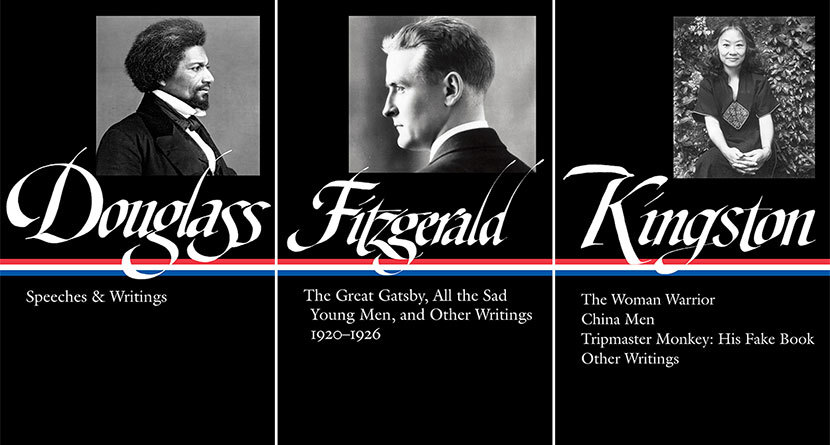
As Library of America prepares to celebrate its fortieth anniversary in 2022, we’re excited to announce our forthcoming titles for the first half of the year, when two living writers will make their series debuts; a masterpiece of Civil War history will be restored to print; and an acclaimed poet–critic offers an insightful and inspiring new reading of the American poetic tradition through a deep engagement with forty poems, from Anne Bradstreet’s “The Author to Her Book” to Joy Harjo’s “Rabbit Is Up to Tricks.” These are just some of the highlights of what’s coming. Consult the list below for details about contents and publication dates for all our spring releases and scroll further down for a fuller description of each new title.
LIBRARY OF AMERICA SERIES
F. Scott Fitzgerald
The Great Gatsby, All the Sad Young Men & Other Writings 1920–1926
James West III, editor
Library of America #353 / ISBN 978-1-59853-714-7
February 2022
John Updike
Novels 1986–1990
Christopher Carduff, editor
Roger’s Version • Rabbit at Rest
Library of America #354 / ISBN 978-1-59853-717-8
February 2022
Maxine Hong Kingston
The Woman Warrior, China Men, Tripmaster Monkey: His Fake Book, Other Writings
Viet Thanh Nguyen, editor
Library of America #355 / ISBN 978-1-59853-724-6
March 2022
Gary Snyder
Collected Poems
Anthony Hunt & Jack Shoemaker, editors
Library of America #357 / ISBN 978-1-59853-721-5
April 2022
Charlotte Perkins Gilman
Novels, Stories, & Poems
Alfred Bendixen, editor
Library of America #356 / ISBN 978-1-59853-719-2
April 2022
Frederick Douglass
Speeches & Writings
David W. Blight, editor
Library of America #358 / ISBN 978-1-59853-722-2
May 2022
Bruce Catton
The Army of the Potomac Trilogy
Gary W. Gallagher, editor
Mr. Lincoln’s Army • Glory Road • A Stillness at Appomattox
Library of America # 359 / ISBN 978-1-59853-725-3
May 2022
SPECIAL PUBLICATION
The Heart of American Poetry
Edward Hirsch, editor
ISBN 978-1-59853-726-0
March 2022
PAPERBACK
Ernest Hemingway
The Sun Also Rises: The Library of America Corrected Text
ISBN 978-1-59853-715-4
January 2022
The long-awaited second volume of Library of America’s authoritative edition of F. Scott Fitzgerald features The Great Gatsby, the landmark novel that cemented Fitzgerald’s reputation as the chronicler of the Jazz Age. Perhaps no other novel of the twentieth century makes a greater claim to being the Great American Novel—for its poetic prose, its exploration of the broad, intertwined themes of money, class, and American optimism, and its enduring popularity. Gatsby is presented here in a newly edited text prepared for Library of America, correcting numerous errors and restoring Fitzgerald’s preferred American spellings. Also included in this volume are Fitzgerald’s third collection of stories, All the Sad Young Men—which features such standout stories as “Winter Dreams,” “The Rich Boy,” and “Absolution”—as well as a generous selection of stories and nonfiction from the period 1920–1926, also in newly corrected texts.
The latest volume in our John Updike edition displays the master stylist of postwar American fiction at the peak of his powers. Roger’s Version (1986) encompasses Updike’s recurring themes of sex, desire, and adultery as well as an emerging interest in the cosmic implications of contemporary scientific breakthroughs. In a dazzling refashioning of the love triangle at the heart of Hawthorne’s The Scarlet Letter, twin adulteries unfold against an uncharacteristic urban backdrop that reveals the heightened contrasts and inequalities of Reagan-era America. Widely hailed upon publication as a masterpiece, awarded a Pulitzer and a National Book Critics Circle prize, Rabbit at Rest (1990) completes the saga of Updike’s most enduring protagonist and concludes his “surpassingly eloquent elegy for his country,” in the words of Joyce Carol Oates. Now in his mid-fifties, the outwardly comfortable and complacent Harry Angstrom has settled into leisured obsolescence, dividing his time between Pennsylvania and the Valhalla Village retirement community in Florida. But alongside Rabbit’s golfing, junk-food consumption, and other forms of ease there loom the unavoidable markers of his mortality.
The child of Chinese immigrants, Maxine Hong Kingston grew up in California and was an unknown writer living in Hawaii when she made her stunning entrance on the American literary scene with The Woman Warrior (1976). Her “memoirs of a childhood among ghosts” was not only an account of growing up poor and Chinese American in the San Joaquin Valley but also an audacious feat of imaginative transformation, drawing on ancient myths and the family stories her mother brought over from China. A companion to The Woman Warrior, which she called her “mother-book,” Kingston’s “father-book,” China Men (1980), spreads out across a broad geographical and historical canvas to envision the lives of her male relatives who immigrated to America. Taken together, The Woman Warrior and China Men offer a profound, kaleidoscopic, genre-defying narrative of the American experience. Kingston’s third book, Tripmaster Monkey: His Fake Book (1990), is the wildly inventive story of Wittman Ah Sing, a Berkeley graduate student whose experience of the San Francisco Beat scene transforms his understanding of his own Chinese heritage. Rounding out the volume are a series of essays from 1978 reflecting on Kingston’s life in Hawaii and hard-to-find pieces about the creative process and Kingston’s account of how most of the reviewers of The Woman Warrior fell prey to lazy stereotypes about the “exotic” and “inscrutable” East. Library of America’s Kingston volume is edited by Viet Thanh Nguyen, winner of the Pulitzer Prize in Fiction for his debut novel The Sympathizer and a former student of Kingston’s.
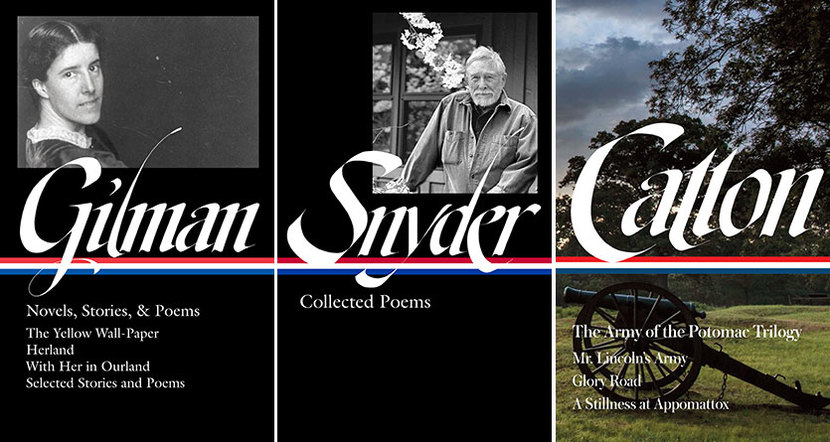
Gary Snyder is one of America’s indispensable poets, the “Thoreau of the Beat Generation” and our “laureate of Deep Ecology.” Now, for the first time, all of Snyder’s poetry is gathered in a single, authoritative volume spanning a career of almost seventy years. Early collections such as Riprap and Cold Mountain Poems, Myths & Texts, and The Back Country reflect his hardscrabble rural upbringing in the Pacific Northwest; his life as a logger, fire-lookout, freighter crewman, carpenter, and trailblazer; his lifelong interest in Native American oral literatures; and his pioneering studies of Zen Buddhism. In Turtle Island and Axe Handles—the former a winner of the Pulitzer Prize in 1975 and the latter the American Book Award in 1984—he explores countercultural alternatives to environmental and spiritual decline and envisions new forms of harmony with nature. His epic Mountains and Rivers Without End, a poem four decades in the making and regarded by many as his masterwork, is followed by Danger on Peaks, and the intimate, preternaturally candid late lyrics of This Present Moment, which meditate on Snyder’s life in the foothills of California’s Sierra Nevada, where he has lived since 1971. The volume concludes with a generous selection, made by Snyder himself, of previously uncollected poems from little magazines and broadsides; translations from East Asian literatures; and drafts and fragments never before published.
The visionary feminist and socialist writer and thinker Charlotte Perkins Gilman joins Library of America with a collection of fiction and poetry that continues to challenge with its originality and imaginative force. Best known for her gothic short story “The Yellow Wallpaper,” Gilman was also the author of the utopian novels Herland and With Her in Ourland, about a newly-discovered country in which there have been no men for 2000 years and the women reproduce using parthenogenesis. Both novels are gathered in Charlotte Perkins Gilman: Novels, Stories, & Poems, along with approximately forty of her best stories, including “The Yellow Wallpaper” (presented in both the published and the almost unknown original manuscript version, which contains a different ending), “The Giant Wistaria” and “The Rocking-Chair,” among others. Also here is a generous selection of Gilman’s poems, many written in support of suffrage and other social reforms, which were considered in her lifetime to be her most essential literary contributions.
One of the greatest orators and essayists in American history returns to the LOA series in Frederick Douglass: Speeches & Journalism, a compelling selection of the great freedom fighter’s shorter writings by his Pulitzer Prize–winning biographer David W. Blight. Selections cover the full range of Douglass’s public career, from the 1840s through the Civil War and Reconstruction to the 1890s: six decades in which he used his voice and wielded his pen in the cause of emancipation, equal rights, and human dignity. In his incandescent jeremiad “What to the Slave is the 4th of July?” he skewers the hypocrisy of the slaveholding republic; and in “The Claims of the Negro Ethnologically Considered” he refutes white supremacist ideology. “Capt. John Brown Not Insane” praises the “self-forgetful heroism” of the abolitionist martyr, and “How to End the War,” published in 1861, calls for the raising of Black troops and the destruction of slavery. In his oration at the Freedmen’s Memorial in 1876, Douglass offers a brilliantly perceptive assessment of Lincoln’s role in emancipation; “There Was a Right Side in the Late War” attacks the “Lost Cause” mythology of the Confederacy; and “The Lessons of the Hour” denounces lynching and disenfranchisement in the emerging Jim Crow South. As a special feature the volume also includes Douglass’s only foray into fiction, the 1853 story “The Heroic Slave,” about a shipboard insurrection.
Bruce Catton’s Army of the Potomac trilogy is a landmark of historical storytelling, one of the most popular and influential works ever written about the Civil War—and yet for decades it hasn’t been available in full. Library of America restores the entirety of this classic to print in a lavish single-volume collector’s edition, with full-color endpaper maps, and detailed notes and a newly-researched chronology of Catton’s life and career by acclaimed Civil War scholar Gary W. Gallagher. Mr. Lincoln’s Army, the first book in the trilogy, describes the Army of the Potomac’s formation as the bulwark of the Union war effort as emerging friction between the army’s commanding general George McClellan and the Commander in Chief in Washington reaches a crisis in the wake of the deadly battle at Antietam. Glory Road recounts the critical months between the autumn of 1862 and midsummer 1863, including the battles at Fredericksburg, Rappahannock, and Chancellorsville which set the stage for the costly Union victory at Gettysburg. Catton’s retelling of the story of Lincoln’s address at Gettysburg remains unrivalled. In A Stillness at Appomattox, which won both Pulitzer Prize and the National Book Award, the Army of the Potomac, now under the driving command of Ulysses S. Grant, finally gains the upper hand against Robert E. Lee, culminating in one of the most vividly drawn accounts of Lee’s final surrender.
What is America and who are we as a people? How do we understand the dreams and betrayals that have shaped the American experience from the beginning? For poet and critic Edward Hirsch, poetry opens new ways of answering these questions, of reconnecting with one another and with what’s best in us. In The Heart of American Poetry, Hirsch offers deeply personal readings of forty essential American poems, ranging from Anne Bradstreet’s “The Author to Her Book” and Phillis Wheatley’s “To S.M., a Young African Painter, on Seeing His Works” to Garrett Hongo’s “Ancestral Graves, Kahuku” and Joy Harjo’s “Rabbit Is Up to Tricks” to explore how these poems have shaped his own life and how they might uplift our life as the diverse nation we have become. The result is a unique and inspiring perspective on the various crises that Americans have confronted—and still confront.
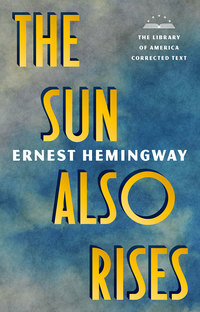
With a letter of introduction from Sherwood Anderson, Ernest Hemingway traveled to Paris in 1921, where he met Gertrude Stein, Ezra Pound, F. Scott Fitzgerald, Pablo Picasso, James Joyce, and other expatriate writers and artists who helped set his course as a writer. With the publication in 1926 of The Sun Also Rises, based on his experiences in Paris and Spain, he solidified his reputation as a leader of literary modernism and established himself as the preeminent voice of the Lost Generation. Library of America’s paperback edition presents a newly edited text of The Sun Also Rises, emended in consultation with Hemingway’s manuscript and the typescript setting copy. Originally published last year in Ernest Hemingway: The Sun Also Rises & Other Writings 1918–1926, volume #334 in the Library of America series, the text corrects numerous errors, restores key changes made to Hemingway’s original punctuation, most notably to the novel’s famous final line, and reinstates references to real people removed by his editor Maxwell Perkins for reasons of impropriety or fear of libel. Additionally, the paperback includes a selection of journalism and letters relevant to the composition of The Sun Also Rises that will enhance readers’ appreciation of the novel.
